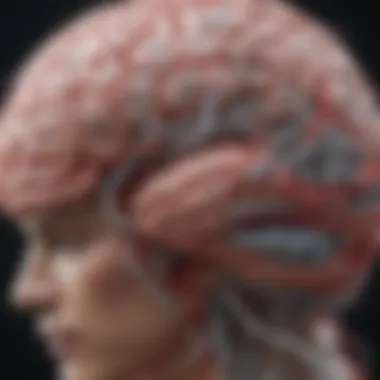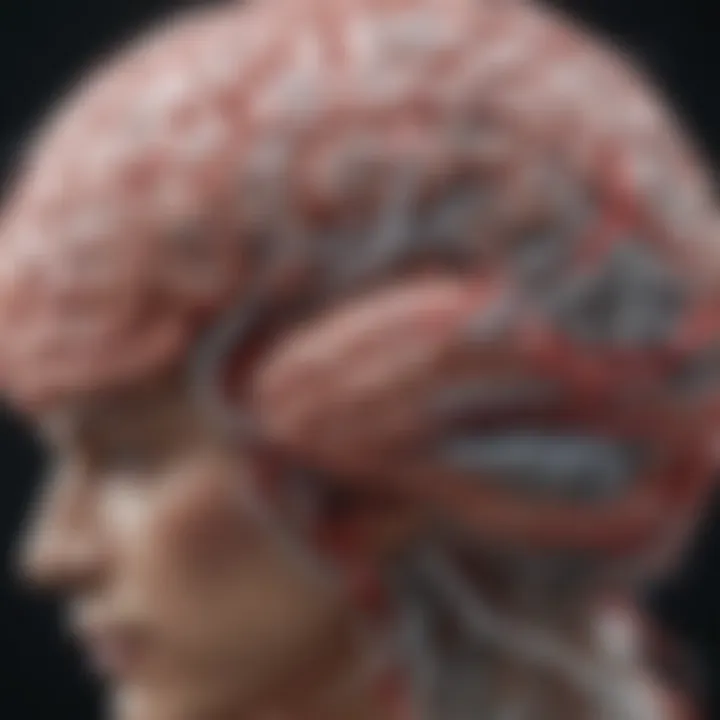Understanding HIV Psychosis: Symptoms and Implications


Intro
HIV psychosis is a mental health condition that affects some individuals living with HIV. It arises due to the infection's complex interaction with brain function. As HIV progresses, various neurological and psychiatric symptoms can emerge. Understanding these symptoms and their implications is crucial for providing effective care and support to those affected.
The relationship between HIV and mental health is intricate. As the virus impacts the immune system, it can also exert effects on cognitive and emotional well-being. Many patients face challenges related to their mental health that require careful assessment and intervention. This article delves into the nuanced nature of HIV psychosis, highlighting its symptoms, diagnostic challenges, and treatment options. A detailed look will also be given to the implications for patients, caregivers, and healthcare providers.
Research Highlights
Overview of Key Findings
The research surrounding HIV psychosis provides critical insights. Firstly, it establishes a clear connection between HIV infection and various psychiatric symptoms. Studies show that HIV-related neurocognitive disorders can manifest alongside psychosis, complicating diagnosis. Significant findings also point toward the importance of early intervention and a multidisciplinary approach to treatment.
Another important finding is the role of antiretroviral therapy in managing HIV psychosis. While these therapies are essential for controlling the virus, their impact on mental health provides an area for further scrutiny.
Significance of the Research
Understanding HIV psychosis is vital for multiple reasons. It enhances the awareness of healthcare providers about the potential for mental health disorders in patients with HIV. Furthermore, it emphasizes the need for comprehensive care strategies that address not only physical health but also psychological needs. Recognition of these relationships allows for more effective communication and care planning, improving overall patient outcomes.
Key Symptoms of HIV Psychosis
HIV psychosis can exhibit various symptoms. Common symptoms include:
- Delusions: False beliefs not grounded in reality.
- Hallucinations: Perceptual experiences without external stimuli.
- Disorganized Thought: Difficulty organizing thoughts can lead to incoherent speech.
- Mood Changes: Observable changes in emotional state, from mania to severe depression.
These symptoms can fluctuate and may be influenced by other factors, such as medication adherence and co-occurring mental health conditions.
The End
In summary, HIV psychosis represents a significant challenge in the management of HIV infection. By fostering a robust understanding of its symptoms and implications, patients, caregivers, and healthcare practitioners can work together to enhance quality of care. The insights from ongoing research will continue to inform best practices and approaches in treating this complex condition.
Intro to HIV Psychosis
Understanding HIV psychosis is essential in the broader discourse of HIV and mental health. HIV psychosis refers to a complex mental health condition that can occur in individuals infected with HIV. This topic is important for various reasons. It bridges the gap between two often-stigmatized issues: infectious disease and mental health. Given the increasing prevalence of HIV, combined with heightened awareness of mental health, this conversation is timely and significant.
An exploration of HIV psychosis sheds light on its symptoms, treatment options, and management strategies. It addresses the intersecting spheres of mental health and chronic illness, articulating how each can exacerbate the other. This knowledge is invaluable for healthcare providers, patients, and caregivers, equipping them with the understanding needed to navigate the complexities of this condition.
Evolving from the complications of HIV infection, the systemic effects of the virus often extend beyond the physical into the cognitive and emotional domains. Thus, examining HIV psychosis becomes a necessary endeavor for all stakeholders involved. It not only fosters greater awareness and understanding among healthcare practitioners but also advocates for improved patient care and the necessity of support systems.
Understanding HIV and Its Systemic Effects
HIV, or Human Immunodeficiency Virus, primarily affects the immune system. Once inside the body, the virus targets CD4 cells, which are crucial for the immune response. Over time, this can lead to Acquired Immunodeficiency Syndrome (AIDS), wherein the immune system becomes severely compromised. The systemic effects of HIV, however, manifest in multiple ways.
Patients may experience a range of physical symptoms, such as weight loss, chronic fatigue, and opportunistic infections. These conditions can lead to significant stress and anxiety, impacting cognitive functions and emotional stability. The psychological burden of living with HIV often intertwines with societal stigma, placing additional strain on individuals, thereby creating a fertile ground for mental health disorders like psychosis.
Understanding these effects is pivotal. Recognizing that HIV is not merely a physical ailment illustrates the urgent need for comprehensive care strategies that address both mental and physical health.
Overview of Psychosis
Psychosis is characterized by a disconnection from reality. Individuals may experience disturbances in thought processes, perceptions, and emotional responses. Common symptoms of psychosis include hallucinations, delusions, and disorganized thinking. This mental state can lead to an inability to differentiate between what is real and what is not, resulting in significant impairment in daily functioning.
There are various triggers for psychosis, including drug use, severe stress, and underlying mental health conditions. In the context of HIV, the interplay between the virus and psychosis becomes increasingly complex. The biological changes induced by HIV can notably affect brain function, thus paving the way for psychiatric symptoms to emerge.
Defining HIV Psychosis
Defining HIV psychosis requires a nuanced understanding of both HIV and psychosis. It is often described as a severe mental illness that presents in individuals infected with HIV, characterized by symptoms consistent with psychotic disorders but necessitates specific considerations.
HIV psychosis typically surfaces in the context of other HIV-related complications or as a reaction to antiretroviral therapy. Unlike typical cases of psychosis, HIV psychosis may fluctuate in severity and is often layered with issues of neuroinflammation or direct viral effects on the central nervous system.
Clinicians must adopt a multifaceted view when considering HIV psychosis, as its functioning intersects with the individual’s physical health, social environment, and psychological well-being. Addressing these factors can lead to better management plans, ensuring holistic patient care.
Symptoms of HIV Psychosis


Understanding Symptoms of HIV Psychosis is crucial for recognizing the interplay between HIV and mental health. This mental health condition emerges when individuals living with HIV experience psychotic symptoms. Identifying these symptoms early can significantly impact treatment efficacy, patient safety, and overall quality of life. The implications extend not only to those directly affected, but also to caregivers and healthcare practitioners.
Common Psychiatric Symptoms
Common psychiatric symptoms of HIV psychosis include depression, anxiety, and psychotic features such as delusions and hallucinations. Delusions might manifest as false beliefs about one’s health condition, often leading to confusion and distress. Hallucinations can involve seeing or hearing things that do not exist. These symptoms often reflect a deepened emotional struggle and can exacerbate the challenges faced by individuals managing HIV. Active monitoring for these signs can aid in timely intervention and treatment.
Effects on Perception and Cognition
The effects of HIV psychosis on perception and cognition are significant. Patients may struggle with attention, memory, and reasoning, which can lead to difficulties in daily functioning. This cognitive decline can create a vicious cycle, where compromised mental processes impact medication adherence and self-care practices. Increasing awareness about these cognitive effects can help in developing tailored strategies that enhance cognitive support and treatment adherence, thus improving patient outcomes.
Behavioral Manifestations
Behavioral manifestations of HIV psychosis can vary widely. Individuals may exhibit erratic behavior, social withdrawal, or even aggression. These changes can alienate friends and family, further isolating the individual. It is essential that caregivers and providers approach these behavioral changes with understanding and compassion, ensuring that supportive measures are in place. Recognizing these manifestations early can also aid in crafting a comprehensive treatment plan that includes mental health and social support interventions.
The recognition of symptoms of HIV psychosis is a key step in providing better care and support for affected individuals. Early detection enables timely intervention, which can significantly enhance patient quality of life.
In sum, the Symptoms of HIV Psychosis are fundamental to understanding the broader implications of mental health in HIV care. A comprehensive approach, including symptom recognition and timely intervention, is essential for improving outcomes for patients.
Causes and Risk Factors
Understanding the causes and risk factors of HIV psychosis is vital for both prevention and effective management of this condition. These factors not only help in identifying individuals who may be at risk but also guide healthcare professionals in formulating targeted interventions. Delving into the biological, environmental, and social aspects of HIV psychosis provides a comprehensive view of its multifaceted nature.
Biological Mechanisms
The biological underpinnings of HIV psychosis are complex and result from the interaction of HIV with the body and brain. The virus can cause direct damage to neural tissue and affect neurotransmitter systems, leading to changes in mood, perception, and behavior. Neuroinflammation is a significant factor; the immune response to HIV can result in inflammation in the brain, disrupting normal cognitive functions.
Evidence suggests that individuals with higher viral loads may experience more severe psychiatric symptoms. This correlation underscores the importance of antiretroviral therapy. Maintaining low viral loads through consistent treatment may mitigate the risk of psychotic disorders, demonstrating a clear link between viral management and mental health outcomes. Moreover, the CD4 cell count serves as another indicator; lower counts are associated with an increased risk of opportunistic infections that may exacerbate psychiatric symptoms.
Environmental and Social Factors
Various environmental and social elements can influence the onset of HIV psychosis. According to research, destabilizing factors such as poverty, homelessness, and social isolation can exacerbate underlying vulnerabilities. These circumstances can lead to increased stress and a weakened immune system, creating a fertile ground for mental health disorders, including psychosis.
Additionally, stigma surrounding HIV remains a significant barrier to care, leading some individuals to avoid seeking help. This avoidance can exacerbate existing mental health issues. Social support networks often play a critical role in buffering against these negative impacts. A supportive environment may help in reducing the prevalence of psychotic symptoms among those living with HIV.
Co-occurring Mental Health Disorders
Many individuals with HIV psychosis also have co-occurring mental health disorders, such as depression or anxiety. These conditions can complicate the clinical picture and may lead to an exacerbation of psychotic symptoms. For instance, the interplay between substance abuse and psychiatric disorders can worsen the mental health status of individuals living with HIV. Drug use may serve as both a coping mechanism and an aggravator of psychosis, resulting in a vicious cycle.
Moreover, certain personality disorders may increase the risk of developing HIV psychosis. It is essential to assess for these co-existing conditions during diagnosis to enhance treatment efficacy. Healthcare professionals should adopt a holistic approach, considering both HIV and any concurrent mental health disorders to develop a comprehensive treatment plan. This delineation between symptoms allows for more effective management strategies and promotes better patient outcomes.
Diagnosis of HIV Psychosis
The diagnosis of HIV psychosis holds significant importance within the context of this article. Identifying HIV psychosis accurately can substantially affect treatment outcomes and enhance the quality of life for patients. Early and precise diagnosis allows healthcare providers to initiate appropriate interventions tailored to each individual's needs. Misdiagnosis can lead to ineffective treatments and exacerbate the patient's overall health condition.
HIV psychosis often overlaps with other mental health disorders, making it crucial to employ rigorous diagnostic methods. This complexity underlines the necessity for healthcare practitioners to be well-versed in the psychiatric implications of HIV infection.
Several key elements emerge when discussing the diagnosis of HIV psychosis:
- Clinical Recognition: Healthcare professionals must recognize the symptoms and contextual factors surrounding the patient's health status. A thorough history of the patient's HIV condition is critical.
- Symptomatology: Understanding the specific symptoms that present in HIV psychosis helps in distinguishing it from other mental health disorders.
- Comprehensive Evaluation: A multidisciplinary approach is beneficial in assessing the patient's medical history, psychiatric history, and social background.
Moreover, establishing a correct diagnosis not only aids in delivering effective treatment but also fosters better communication between patients and caregivers. The implications of misdiagnosis can lead to distress for both parties and complicate the management of underlying health issues. Thus, nuanced understanding and clinical skill in diagnosis are essential for successful outcomes in managing HIV psychosis.
Clinical Assessment Techniques
Clinical assessment of HIV psychosis involves a series of systematic approaches to gather information about a patient's condition. Several techniques are commonly utilized:
- Clinical Interviews: Engaging in detailed patient interviews provides insight into their mental state, functionality, and history.
- Standardized Assessment Tools: Using validated instruments such as the Positive and Negative Syndrome Scale (PANSS) can help quantify symtoms.
- Medical Evaluation: Assessing physical health through laboratory tests and imaging to rule out other potential causes is crucial.
- Observation: Monitoring patients in various settings can reveal behavioral patterns indicative of psychosis.
These techniques assist clinicians in forming a comprehensive picture of the patient’s mental health status, guiding appropriate interventions.
Challenges in Diagnosis


The diagnosis of HIV psychosis faces various challenges. Key factors include the variability in symptom presentation and the overlap with other psychiatric conditions. Some important challenges are:
- Symptom Overlap: Symptoms like anxiety or depression may mask or mimic psychosis, complicating the diagnosis.
- Stigma: Fear of stigma associated with HIV or mental illness can prevent patients from sharing crucial information, affecting diagnosis.
- Resource Limitations: Insufficient access to trained professionals in mental health may hinder prompt and accurate diagnosis, especially in rural areas.
Addressing these challenges is vital for healthcare systems aiming to improve diagnostic accuracy and ensure timely treatment.
Differential Diagnosis Considerations
When diagnosing HIV psychosis, clinicians must conduct a thorough differential diagnosis to distinguish it from other mental health disorders. Important considerations include:
- Substance-Induced Psychosis: Substance use can often lead to symptoms similar to HIV psychosis. It is essential to rule this out.
- Mood Disorders: Conditions like bipolar disorder or major depressive disorder may require similar treatments, hence differential diagnosis is critical.
- Neurological Impairments: HIV can lead to neurological issues, which should be considered when assessing mental status.
In summary, professionals must take a cautious and comprehensive approach to diagnosis, considering various potential conditions that may present with overlapping symptoms. This thoughtful process supports better treatment strategies and patient outcomes.
Treatment Options for HIV Psychosis
In addressing HIV psychosis, it is crucial to examine the variety of treatment options available. Effective treatment plays a significant role in improving patient outcomes and overall quality of life. An individualized approach often results in better management of symptoms and enhances the patient's ability to cope with the challenges presented by both HIV and psychosis. This section covers pharmacological approaches, psychotherapeutic interventions, and holistic and supportive care, thereby providing a comprehensive view of how these options function synergistically.
Pharmacological Approaches
Pharmacological interventions are often the first line of treatment for HIV psychosis. Antipsychotic medications can be vital in managing symptoms such as delusions, hallucinations, and severe mood disturbances. Common medications used include Risperidone, Olanzapine, and Quetiapine. These drugs aim to stabilize mood and reduce psychotic symptoms.
However, choosing the right medication requires careful consideration. Some antipsychotics may interact with HIV medications, so healthcare providers must closely monitor these interactions. Additionally, the side effects of antipsychotics, such as weight gain and metabolic issues, could complicate the patient's overall condition. Therefore, a personalized regimen, guided by psychiatric expertise, is essential for optimal management.
Psychotherapeutic Interventions
Psychotherapy forms an integral part of treating HIV psychosis. Therapeutic approaches, such as Cognitive Behavioral Therapy (CBT), focus on helping patients understand and manage their thoughts and behaviors. CBT can help patients cope with the anxiety and stress related to their diagnosis while addressing distorted thinking patterns commonly found in psychosis.
Another valuable approach is supportive therapy, which provides patients with emotional support and practical assistance in managing their illness. The therapist’s role is to foster a safe space where patients feel understood and supported. Involving family members in therapy sessions can also enhance treatment effectiveness by promoting better communication and understanding within the family unit.
Holistic and Supportive Care
Holistic care acknowledges that managing HIV psychosis extends beyond medication and therapy. This approach addresses the patient's overall well-being, including physical health, emotional health, and social connections.
Support groups can also play a crucial role, offering a sense of community and shared experiences. Engaging in regular physical activity can improve mood and reduce symptoms of psychosis. Moreover, nutritional therapy, including a balanced diet rich in vitamins and minerals, supports cognitive and physical health.
Implications for Healthcare Practitioners
Understanding HIV psychosis is critical for healthcare practitioners. It affects not only the wellbeing of patients but also the dynamics of clinical practice. Awareness of the symptoms and challenges associated with this condition allows practitioners to provide timely and effective care. Mental health considerations must be integrated into the overall treatment plans for individuals with HIV. Failure to recognize HIV-related psychological conditions can lead to misdiagnoses and poor treatment outcomes.
*
Training and Awareness
Training is essential for healthcare providers working with HIV patients. Many practitioners may not have a strong background in psychiatric disorders, particularly those linked with chronic conditions like HIV. Training programs should include information on the symptoms of HIV psychosis and how they differ from other psychiatric issues.
Both clinical and non-clinical staff should be equipped with the training necessary to identify early signs of psychosis. Workshops focusing on HIV-related mental health can enhance understanding and improve patient interactions. Awareness can significantly affect the quality of care and outcomes for patients. The more informed the staff, the better the support they can provide to those in need.
*
Interdisciplinary Approaches to Care
Collaborative care models are advantageous when managing patients with HIV psychosis. An interdisciplinary approach brings together various healthcare professionals, including doctors, psychologists, and social workers. This team can address the comprehensive needs of patients, offering holistic treatment strategies.
In such frameworks, communication is key. Regular meetings where team members discuss patient progress can enhance treatment plans. Interdisciplinary strategies can also ensure that there's a continuity in care. Patients often feel more supported when multiple providers are engaged in their treatment.
Featured approaches include:
- Regular mental health screenings as part of routine care
- Joint care plans that incorporate various aspects of health
- Consistent follow-up procedures that involve different specialists
*


Impact on Patient Care Outcomes
The implications of understanding HIV psychosis extend directly to patient outcomes. Patients who receive comprehensive care that includes mental health support tend to respond better to antiretroviral treatments and are more likely to maintain their adherence to medication regimens.
For effective management, it’s essential to:
- Monitor both physical and mental health closely
- Provide education to patients and caregivers about signs of psychosis
- Encourage open dialogue to reduce stigma surrounding HIV-related mental health issues
Effective training, interdisciplinary collaboration, and a focus on comprehensive care can dramatically improve the quality of life for those battling HIV psychosis. Without these strategies, healthcare practitioners may overlook significant aspects of a patient's health, inadvertently compromising their overall treatment journey.
"Mental health is an integral part of overall health. It is important to address both to provide the best possible care to patients with HIV."
Ultimately, cultivating this understanding among healthcare providers fosters a supportive and effective treatment environment, positively influencing patient care outcomes.
The Role of Caregivers and Support Networks
The role of caregivers and support networks in managing HIV psychosis is essential. Caregivers often provide the emotional and practical support needed for individuals experiencing this condition. Their involvement can greatly affect treatment outcomes and quality of life. Understanding the dynamics of this caregiver-patient relationship provides insights into the comprehensive care necessary for those affected.
Understanding the Caregiver Experience
Caregivers face numerous challenges while supporting individuals with HIV psychosis. These challenges can be emotional, psychological, and physical. They often experience stress and burnout due to the demanding nature of their role. A study by the University of California has shown that caregivers can feel isolated, which affects their well-being.
Moreover, caregivers often need to learn about HIV and its psychological implications. Educating themselves is key to better supporting their loved ones. This knowledge can help them recognize symptoms of psychosis early and seek appropriate help. In this manner, they can also play an active role in the management plan set by healthcare professionals.
Establishing Support Structures
Creating support structures is critical for caregivers to sustain their own health and effectiveness. Key components of a solid support structure include:
- Peer Support Groups: These can provide caregivers with a platform to share experiences and coping strategies.
- Family and Friends Involvement: Encouraging relatives and friends to participate can lighten the burden on primary caregivers.
- Professional Counseling: Allowing caregivers to express their feelings and frustrations in a safe environment can be beneficial.
Individual support structures help in preventing burnout. They ensure caregivers do not neglect their self-care needs, allowing them to provide better care.
Resources for Caregivers
An array of resources exists to assist caregivers in their journey. Some essential resources include:
- National Alliance on Mental Illness (NAMI): Offers resources and workshops for understanding mental health.
- HIV/AIDS Service Organizations: Such organizations often have support groups and informational materials tailored for caregivers.
- Online Forums and Communities: Websites like reddit.com host forums where caregivers can connect with one another, sharing stories and advice.
These resources help caregivers feel supported and informed. This integration of support enhances their capabilities, leading to improved outcomes for those they care for.
Caregivers must prioritize their health to maintain the strength necessary for their role. Self-care is not selfish; it is essential.
Future Directions in Research
Understanding HIV psychosis is crucial for developing effective strategies in patient care. Research in this area can lead to a deeper comprehension of the intricate connections between HIV and mental health, ultimately enhancing treatment options. Future research directions will help address current knowledge gaps and explore innovative approaches to manage symptoms and improve overall outcomes for individuals experiencing this condition.
Emerging Studies and Findings
Recent studies have increasingly focused on the neurobiological impacts of HIV on mental health. For instance, research highlights the role of neuroinflammation in the development of cognitive impairments and psychotic symptoms in HIV-positive individuals. Furthermore, investigations into the effectiveness of antiretroviral therapies show promise in mitigating some psychiatric manifestations of HIV. Such findings underscore the need for integrative research, combining mental health disciplines with infectious disease frameworks.
It’s important to encourage collaboration among researchers from various fields. This engagement can generate multidisciplinary studies that can more adequately address the complexities of HIV psychosis.
Gaps in Current Research
While progress has been made, significant gaps remain in the understanding of HIV psychosis. A notable area of concern is the limited longitudinal studies tracking the evolution of psychotic symptoms in patients over time. Many existing studies focus on short-term outcomes, which can lead to a misunderstanding of the long-term implications of HIV on psychiatric health. Additionally, there is a lack of diversity in research populations, often leading to results that may not be generalizable to broader patient demographics.
Addressing these gaps is vital. It allows for a better grasp of how various factors—such as age, gender, and socioeconomic status—affect the presentation of HIV psychosis.
Potential Areas for Further Investigation
Several areas warrant further exploration to advance understanding of HIV psychosis.
- The interplay between HIV, inflammation, and mental health. This area includes examining how persistent inflammation relates to psychosis and cognitive decline.
- The impact of social determinants on mental health outcomes. Research could investigate how stigma, isolation, and access to care contribute to the onset and progression of psychotic symptoms.
- Psychotropic medication efficacy in context. Studies should look at how various treatments affect psychiatric symptoms in conjunction with antiretroviral therapy.
With the right focus, future research can bridge the existing divides and improve practices in treating HIV psychosis. Ultimately, a comprehensive understanding will lead to better care frameworks and support systems for affected patients.
"Continuous research efforts are essential in directing future healthcare policies and improving quality of life for those living with HIV psychosis."
Research in these relevant areas has the potential to transform clinical practices and provide meaningful interventions for this vulnerable population.







